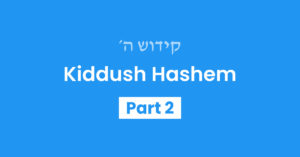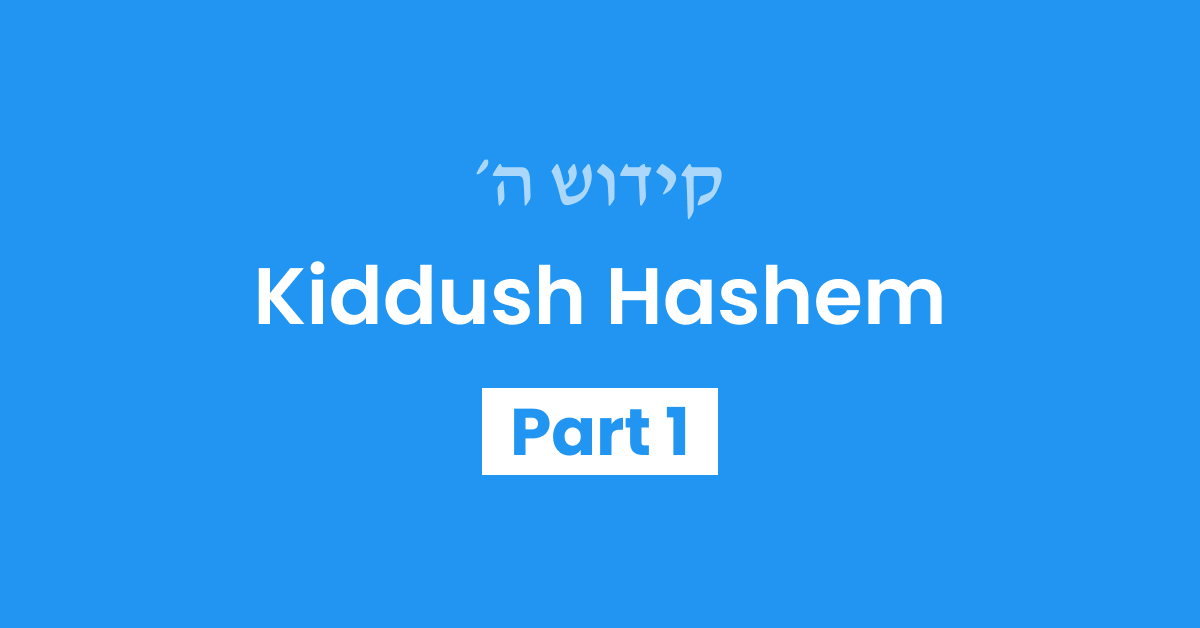For the past few weeks, we have been discussing the concept of Kiddush Hashem. First, we discussed how the entire world was created for the purpose of Kiddush Hashem, but the unfortunate reality is that Hashem’s Presence cannot be fully revealed on this earth for as long as we are in exile. Even if my own life seems okay right now, I must remember that the world as a whole is still aching in pain, for as long as Hashem’s Presence is hidden from mankind.
We then explained that in addition to davening for Mashiach, another way we can help the world fulfill its purpose is by doing our own personal acts of Kiddush Hashem. Every time we do a mitzvah, we are making a Kiddush Hashem because we are increasing awareness of Hashem in front of our own two eyes. The more that we remember Hashem, the more we will be living in a state of personal “geulah.” But to the degree that we allow ourselves to forget Hashem, to that degree we are allowing ourselves to wallow in personal “galus.”
This week, let’s address an interesting question: If we want to make a Kiddush Hashem, what is the best way to do it? Would it be better to make a Kiddush Hashem in public, where many people will see it? Or would it be better to make a Kiddush Hashem in private, where we are the only ones who know what happened?
A Matter of Mixed Motivations
Rav Dessler1 answers by explaining the following: Although it would be most powerful to make a Kiddush Hashem in public, the purest form of making a Kiddush Hashem is often achieved by making a Kiddush Hashem in private. Why?
Rav Dessler explains that for every act that a person does, it’s usually true that the more private it is, the more sincere it is. But when someone does a mitzvah in public, it’s more likely that he will have mixed motivations. For example, when someone davens out loud and cries his heart out in front of other people, it’s very possible that his tefillos are sincere… but it’s also possible that he is crying so that other people will see him and think he is such a tzaddik.
Or when a person learns in the Beis Medresh all night until the wee hours of the morning, it’s possible that his learning stems from his tremendous Ahavas HaTorah… but it’s also possible that he’s doing it because he wants other people to think of him as a big masmid.
Whenever we do mitzvos in front of other people, we are at risk of having mixed motivations. But when we do mitzvos in private, we have more of an opportunity to do them purely for the sake of giving honor to Hashem. Every time we do a mitzvah in private – this, too, is considered a Kiddush Hashem, because we are giving honor to Hashem in front of our own two eyes.
We can make a very pure, sincere type of Kiddush Hashem by doing a mitzvah in private, when no one else knows.
By committing ourselves to fulfilling Hashem’s commands even when it might be very hard for us, and even when no one else will be impressed by our actions, we can make a great Kiddush Hashem and bring the world closer to fulfilling its ultimate purpose.
This week, let’s try to find opportunities to do mitzvos in private, which will make a Kiddush Hashem in front of our own two eyes. The more we practice making a Kiddush Hashem in private, the more we will strengthen our sincere yearning to reveal Hashem’s Presence in this world, and the more we will help bring Mashiach closer and hasten the Ultimate Geulah.
Sources: [1] Michtav Mei’Eliyahu Vol. 3 pg. 117
Your Challenge
Once a day, find an opportunity to make a Kiddush Hashem “in private” – in a way that no one else sees, and only you are aware of.
(Doing any mitzvah qualifies as “making a Kiddush Hashem,” since every mitzvah helps to reveal Hashem’s Presence in this world.)
FOR EXAMPLE:
- When you are tempted to look at something you shouldn’t see, restrain yourself from looking.
- When you are tempted to say something you shouldn’t say (lashon hara, a joke that might hurt someone, or unrefined words), close your mouth and refrain from saying it. (No one else knows you were planning to say it!)
- When you are davening or saying a bracha, take care to say the words slowly and clearly – even if no one else will hear you.
Torah Questions
- Which Navi made a big Kiddush Hashem by causing everyone to recognize that Hashem is the only true G-d who has power? (See Melachim I: Chapter 18)
- What did the Jewish people say when this Navi proved to them that Hashem is the real G-d? (Melachim I 18:39)
- Which words in the Shema teach us that a person should be prepared to even give up his life for the sake of Hashem? (See Devarim 6:5 with Rashi)
- There was once a Tanna who made a great Kiddush Hashem by continuing to express his dedication to Hashem, even as he was being executed to death by the Romans and they were tearing his flesh with iron combs. Which Tanna was it? (See Brachos 61b)
- According to the Gemara (Yevamos 79a), it is better to uproot one _____ in the Torah than to cause a disgrace to Hashem’s Name in public.
- According to the Gemara (Kiddushin 40a), it is better for a person to _____ than to desecrate Hashem’s Name in public.
Questions to Ponder
- There is a mitzvah for every Jew to give 3 parts of each of their sacrifices to a kohen. The Sefer HaChinuch writes that this “gift” is given to all kohanim as a reward for Pinchas (a kohen) who made a big Kiddush Hashem by stabbing Zimri and Kozbi when they were sinning together. Why do you think this type of gift is a fitting reward for Pinchas and his descendants? Why didn’t Hashem give them some other type of reward instead?
- The Gemara says that wild animals will come into this world as a consequence of people who swear falsely or make a Chillul Hashem. Why do you think that being subjected to wild animals is a fitting punishment for these sins?
- Rabbeinu Yonah writes that if a talmid chochom does not conduct himself in a modest manner, he deserves to be killed by Heaven, since he is causing people to hate the Torah. Why do you think a talmid chochom’s lack of tznius would cause people to hate the Torah (ch”v)? And why is it worse for a talmid chochom to make such a Chillul Hashem than for any other Jew to do so?




